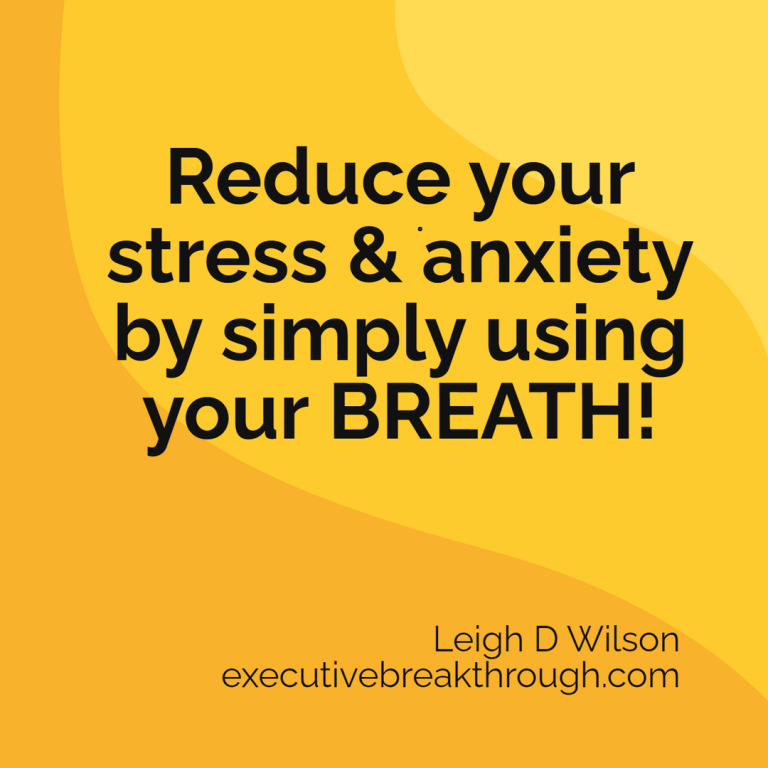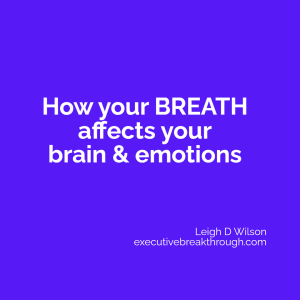(Extract from one of my books: “Overcoming Financial Stress: How to Conquer Your Financial Fears & Create a Better Future”)
Have you ever have sighed when you were feeling tired and a bit flat? Have you ever gasped when you’ve been startled? These two opposite reactions to your emotional state – breathing out forcefully when you are in a ‘down’ state, and breathing in forcefully, filling your lungs with oxygen, in situations where you are startled or frightened – demonstrate how your breathing and your emotional state are intimately related.
If you are calm and relaxed, your breathing will become calm and steady. If, on the other hand, you are upset in some way, perhaps by being frightened, angry or tense, your breathing will become disturbed and irregular. Similarly, if you are depressed, you will breathe in a shallow fashion from the upper part of your chest, probably accompanied by frequent sighs. Because of the intimate mind-body connection, shallow jerky breathing is disturbing for your mind, which, in turn, affects the biochemistry of your body
Your breathing is controlled by your autonomic nervous system (ANS), the part of your peripheral nervous system which that the bodily functions that operate in an unconscious and involuntary fashion. The ANS controls things such as heart rate, digestion, respiration rate, salivation, perspiration, pupil dilation, urination and sexual arousal. While most of these functions are involuntary, some of them, such as breathing, can also be partially controlled by conscious will.
There are two main subsystems to the ANS: the sympathetic nervous system and the parasympathetic nervous system. There is also a recently discovered third subsystem that is not relevant to our discussion here.
The sympathetic nervous system prepares your “fight-or-flight” response to danger, described earlier, mobilizing systems within your body to maximize arousal and energy generation, while simultaneously inhibiting digestion. Specific hormones are released into your body from the endocrine system, which initiate a rapid and generalized response. This is characterized by an increase in your heart rate, anxiety, increased perspiration and blood glucose concentrations. Your increased heart rate stimulates cardiac contraction thereby increasing cardiac output. It also dilates your bronchi, increasing airflow into and out of your lungs and dilates your blood vessels to facilitate blood flow to the limbs to help you prepare to either fight or to flee.
It does not matter whether the danger is real or not: what matters is whether you perceive it as being real. Your body’s reaction to the brown curved snake-like looking object near your foot on a bush trail is exactly the same whether it is actually snake or simply a stick.
Your emotional state affects your breathing and your breathing affects your emotional state. Because chest breathing is your body’s emergency breathing system, it actually activates the “fight-or-flight” alarm reaction. And it doesn’t matter whether you are actually facing physical danger or not: if you breathe from your chest, your body will respond as if you actually are in peril.
So if your normal breathing is shallow, restricted to your chest, you are constantly sending subtle messages to your brain and your autonomic nervous system that you are facing danger, thereby maintaining a constant state of stress in your body and mind so that you are never able to completely relax. The longer you maintain this habit, the more ingrained it will become, the greater your imbalance and the greater the “wear and tear” on your nervous system.
The counterpart to the sympathetic nervous system is the parasympathetic nervous system. It sends a message that “all is well”, “you can relax now”, “you have everything under control” and is accompanied by deeper diaphragmatic breathing. The parasympathetic nervous system reduces your heart rate and allows digestion to occur. And, just as your emotional state affects your breathing, your breathing affects your emotional state in this context as well. By developing a habit of breathing with smooth, even diaphragmatic breathing, you will be constantly reminding your nervous system that everything is okay.
Remembering that a powerful inward breath triggers the sympathetic nervous system and a slow, steady, smooth outward breath invokes the parasympathetic nervous system gives new understanding to common expressions such as such as “a gasp of pain,” or “I’m taking a breather,” or “he gave a sigh of relief”.
Now that you understand the relationships that exist between your breathing and your emotions you will be able to use your breathing to restore your inner sense of balance and calm whenever you’re feeling stressed or under pressure. The more regularly you practice this, the more skilful you will become.
Try this
Note: do not do the following exercise if you’re suffering from chronic depression or when you feel particularly low, as your parasympathetic system will already be too dominant and will not require further stimulus. Rather, do the alternate nostril breathing exercise below.
- Lie on your back, again preferably on the floor if possible, and gently close your eyes.
- Relax and focus on your belly-breathing.
- When you’re breathing has become smooth and steady, with no jerks or stops, gently slow the rate of your outward breath until you are breathing about twice as long outwardly as you breathe inwardly. You might find it necessary to reduce the length of your inhalation slightly. Note that you are simply altering the rhythm of your breathing: you are not trying to fill your lungs completely nor to empty them completely.
- To establish the new rhythm, you can choose to count up to six on your outward breath while counting to three on your inward breath, or eight and four respectively if this feels more comfortable. Once you have established a steady rhythm and your breathing is smooth and regular, you can stop counting mentally and simply focus on maintaining the rhythm, the smoothness and the evenness of your breathing.
- As you do this, take note of how you feel.
#anxiety #stress #worry #overwhelm #fear #procrastination #selfesteem #selfconfidence #emptiness #loneliness #failure #sadness #guilt #selftalk #burnout











